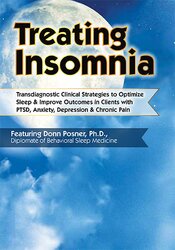

If you aren’t asking about your clients’ sleep, you’re making mistakes as a clinician. All clinicians should know how to properly assess and treat insomnia – sleep is that important for your clients’ health and quality of life.
It’s no secret that insomnia frequently develops as a result of PTSD, anxiety, depression, chronic pain, and a wider variety of other behavioral and medical disorders. Traditional wisdom has been that if you treat the primary disorder, the insomnia will go away. However, the data does not support this traditional wisdom. Although the primary disorder improves somewhat, the insomnia often does not, which can lead to diminished improvements in clinical outcomes regarding the primary disorder, increased dropout rate and higher relapse rates.
Despite you doing everything you can to target the primary disorder, your client continues to be tired and struggles more with symptoms of the primary disorder, leaving you frustrated and overwhelmed because you don’t know what to do next. The truth is, when clients have PTSD, anxiety, depression, or chronic pain, their symptoms are made worse --- and treatment more difficult --- when they’re not able to sleep. Therefore, the insomnia must be targeted directly.
Improve clinical outcomes in clients by integrating the treatment of insomnia into your practice!
Watch Diplomate in Behavioral Sleep Medicine Donn Posner, Ph.D., and he’ll walk you step-by-step through the treatment of insomnia. You’ll learn how to properly assess and develop a treatment plan for insomnia, as well as how to educate your clients about sleep to make them experts on their own sleep disorders. Discover evidence-based strategies to help your clients sleep longer and more efficiently, as well as enjoy increased energy levels during the day. As a result, your clients’ symptoms of PTSD, anxiety, depression, and chronic pain will decrease in frequency and severity.
You’ll walk away from this recording with the tools you need to treat insomnia. Better still, you’ll add vital techniques to your clinical tool kit that you didn’t know were missing.
Learn how to treat insomnia and revolutionize your treatment outcomes!
| File type | File name | Number of pages | |
|---|---|---|---|
| Manual - Treating Insomnia (5.7 MB) | 87 Pages | Available after Purchase |

Donn Posner, PhD, DBSM, is the founder and president of Sleepwell Consultants and provides consultation to organizations and individuals on a wide variety of sleep health issues including insomnia, circadian dysrhythmia, CPAP adherence, and parasomnias. He is an adjunct clinical associate professor in the department of psychiatry and behavioral sciences at the Stanford University School of Medicine and a consulting psychologist for the Palo Alto VA. Dr. Posner works on a number of grants exploring the effects of CBT-I in Gulf War Veterans, and Veterans with insomnia and Mild Traumatic Brain Injury. He is also conducting a pilot aimed at using CBT-I techniques to decrease fatigue in breast cancer survivors by increasing total sleep time. Dr. Posner spent 25 years as the Director of Behavioral Sleep Medicine for the Sleep Disorders Center of Lifespan Hospitals and was a Clinical Associate Professor in the Department of Psychiatry and Human Behavior at the Warren Alpert School of Medicine at Brown University. He is a member of the American Academy of Sleep Medicine and is one of the first Certified Behavioral Sleep Medicine specialists recognized by that group. He is a founding member of the Society of Behavioral Sleep Medicine, and he has achieved the status of Diplomate of Behavioral Sleep Medicine (DBSM).
Speaker Disclosures:
Please wait ...